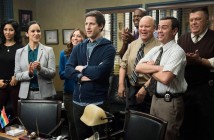Doctor Who, Series 8, Episode 7, “Kill the Moon”
October 4, 2014, 8:00 p.m. (EST), BBC
As we move past the half-way point of this series of Doctor Who, it’s clear that the focus of this season is choice. The Doctor creates himself with every decision he makes, shifting further from the person he used to be toward the person he is now, he makes choices, and those choices have consequences, both personally, in an existential context, and universally, because when The Doctor chooses, people live or die based on his certitude and his accuracy. But “Kill the Moon” isn’t an episode about The Doctor making a choice. No, it is, once again, about Clara, the choices she makes, and the life that leads to.
We’ve talked earlier this season about Steven Moffat’s issues with women, and about the way that he seems to have failed to internalize the completely valid criticisms of his era. “Kill the Moon” (which, it should be noted early and often, was written by Peter Harness, and was initially a story written for The Eleventh Doctor) is a complex episode that defies my early attempts at cogent analysis. Parts of it made me uncomfortable. Its resolution made me wonder about the full moral and political implications of its message. But ultimately, this is an episode of Doctor Who where The Doctor leaves the room so three women can make a seismic decision for themselves. And that, if nothing else, makes it remarkable.
My immediate reaction to “Kill the Moon” is to think of it as basically a metaphor for abortion, and one which seems to dance perilously close to being a pro-life parable. There’s a creature waiting to emerge, lurking inside something once familiar and innate that turns it into something alien. We have no idea what might come out when it is born. It could be something wonderful. It could be something horrible. It could kill us. It could save us. And the choice we have to make is whether to let this incalculable risk be born, or to terminate it before it ever gets to “feel the sun on its back.” Hearing this debate, and knowing Doctor Who as I do, I was convinced early on that the show would choose to let the creature hatch from the Moon (which is an egg, because go with it) and that something wonderful would emerge. This elides a lot of the real-life decisions that women faced with incredibly difficult choices make, and it also comes across as fundamentally sort of condescending. At first blush, it seems to be a message about the sanctity of life and the beauty of possibility. It seems to be arguing that abortion is a moral wrong that will doom humanity to an early extinction.
And yet. The Doctor leaves the room. He even goes so far as to say “Womankind, it’s your choice,” putting the sort of fine point on this story’s moral Doctor Who engages in far too often, and yet, here it feels right because here it clears up something that might otherwise have been muddled. “Kill the Moon” isn’t arguing for the result so much as it is arguing for the process. Throughout this season, Clara has been constantly asserted as The Doctor’s moral compass, and yet, the history of Doctor Who has trained us to think of The Doctor as a moral arbiter. The Doctor doesn’t always do the right thing, but he always strives to. He doesn’t always save the day, but he fights to save as many lives as he can. Try as the show might to undermine this, The Doctor is fundamentally the hero in the minds of the audience. Which shifts the real moral of “Kill the Moon,” for me. This isn’t a story about the moral implications of choice. It is a story about the moral imperative of choosing. And, more importantly, it is about the act of conveying agency. The Doctor doesn’t abdicate some grander moral responsibility here. He let’s Clara, and Lundik, and Courtney make a moral decision themselves. He let’s them step into the role of heroes. He lets these women make the decision for themselves. He isn’t saying he couldn’t make the right choice here. He is acknowledging that sometimes, the choice isn’t his to make.
The gender in that last sentence is absolutely fundamental to the story here, and it almost justifies Moffat’s decision to cast a man as The Twelfth Doctor (I say almost because I a) Don’t buy that he was doing it to make any point about male primacy and the flaws of the patriarchy, and b) even if he was, that’s not as important a point as having The Doctor be a woman). “Kill the Moon” is about the fact that some decisions aren’t ours to make. This is a tougher lesson for men to learn as women, because women are told constantly and from an early age that they shouldn’t be making certain decisions. Yet men, even good men, even crusading feminists who fight for equality, often fail to grasp the essential point that equality sometimes means backing off. It sometimes means shutting up, even when you think you know better. It sometimes means leaving the room, and letting a woman decide.
There’s a lot to “Kill the Moon” that I haven’t hit on here. The episode uses the conceit of the flash-forward brilliantly. It plays with the detached nature of The Doctor’s new incarnation in fascinating ways. It calls back to “The Seeds of Death,” the beautifully elegiac Second Doctor story about the consequences of man’s apathy in regards to space travel in ways I appreciate even as I am still unraveling. “Kill the Moon” is an episode that deserves to be watched multiple times, and I’ve only watched it once. I will be watching it again very soon, but I choose to use this review as a marker of my initial thoughts rather than as an attempt to be definitive on what this episode of television means to fans of Doctor Who, fans of television, fans of feminism and humanism and idealism. Because I’m not the person to say those things. I’m not the one to make those calls. It’s easy to watch Doctor Who and to think of yourself as The Doctor, as the hero crusading throughout time and space to right wrongs and save lives. But sometimes you’re not The Doctor. Sometimes you aren’t even the companion. Sometimes, you’re barely the guest star, you’re an observer in a story that is bigger than you and that doesn’t necessarily even need to involve you. Sometimes, someone else is the hero. And while “Kill the Moon” doesn’t always make that point as elegantly as it might, I think it is a remarkable point for Doctor Who to be making. It is one I can stand behind, and one that makes the point that sometimes standing behind a cause is as important as championing it. “Kill the Moon” is a great hour of television, one that deserves to be cherished, and treasured, and analyzed again and again. It’s one that demands we return to it, early and often. It is quietly revolutionary in ways that leave me reeling. It is marvelous television. It is someone else’s story. And honestly, can we ever ask for more from TV than that?
The Roundup
- “An innocent life versus the future of all mankind. We have 45 minutes to decide.”
- “She stole your psychic paper, been using it as a fake ID.” “For what, to get into museums?”
- “You can’t just take me away like that. It’s like you kicked a big hole in the side of my life. You really think it? I’m nothing? Not special?”
- “One small thing for a thing, one enormous thing for a thing-y thing.” “So much for history.”
- “So then you came up to rescue them with your bombs?”
- “When I say ‘run,’ run.” “What makes you the boss?” “Well, you say ‘run’ then!”
- “Good stuff, Courtney. Just don’t try that at home, ok?”
- “Doctor, this is dangerous now.” “It was dangerous before. Everything’s dangerous if you want it to be. Crossing the road’s no way to live your life.”
- “She’s fine. What are you, thirty-five? “I’m fifteen!”
- “Clara, there are some moments in time that I simply can’t see. Little eye-blinks. They don’t look the same as other things. They’re not clear. They’re fuzzy. They’re gray. Little moments in which big things are decided. And this is one of them. Just now, I can’t tell what happens to the moon, because whatever happens to the moon hasn’t been decided yet. And it’s going to be decided here, and now.”
- “How can the moon die, though?” “Everything does, sooner or later.”
- “That doesn’t live under the moon. That is the moon.” “What the hell are you talking about?” “The moon isn’t breaking apart. The moon is hatching. The moon’s an egg.”
- “I think that’s unique. I think it’s the only one of its kind in the universe. I think it’s utterly beautiful.” “How do we kill it?”
- “It is killing people. It is destroying the earth.” “You cannot blame a baby for kicking.”
- “What do we do?” “Nothing.” “What?” “We don’t do anything. I’m sorry, Clara. I can’t help you.” “Well of course you can help.” “The Earth is not my home, the Moon is not my moon. Sorry.”
- “Look, there are moments in every civilization’s history in which the path of that entire civilization is decided. The whole future path. Whatever future humanity might have depends upon the choice that is made right here, and right now.”
- “I’ve never killed Hitler. And you wouldn’t expect me to kill Hitler. The future is no more malleable than the past.”
- “It’s time to take the stabilizers off your bike. It’s your moon, womankind. It’s your choice.”
- “You want today to be the day life on Earth stopped because you couldn’t make an unfair decision?”
- “You made your decision. Humanity made its choice.” “No, we ignored humanity.” “Well there you go.”
- “Thank you for stopping me. Thank you for giving me the moon back.”
- “Ok, Captain, you’ve got a new space program to start. NASA is…that way. About 2,00 miles.”
- “I’m done. I’m finished with him. I’m done. What is that look for? Why don’t you believe me?”
Because you’re still angry. You’re never finished with anyone while you’re still angry.”
“Kill the Moon” is an episode that deserves to be watched multiple times.
-
AMAZING




